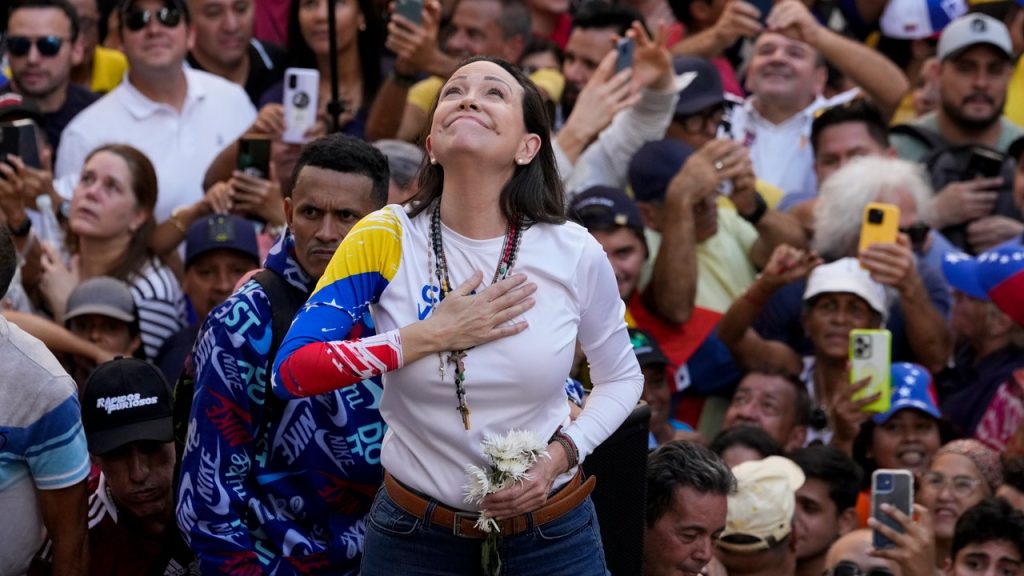The political landscape in Venezuela was thrown into further turmoil on Thursday, marked by protests, a disputed detention, and escalating tensions between the opposition and the government of Nicolás Maduro. The central figure in the day’s events was Maria Corina Machado, a prominent opposition leader known for her unwavering stance against Maduro’s rule. The day’s confusion began after Machado addressed a rally of her supporters, urging them to resist Maduro’s impending inauguration for a third term, which the opposition considers illegitimate. Following the rally, Machado departed on a motorcycle, accompanied by a security convoy, her destination unknown. Shortly thereafter, her press team announced that her convoy had been “violently intercepted” by security forces. This initial report was quickly followed by confirmations from her aides to international media outlets that Machado had been detained, sparking immediate condemnation from international leaders across Latin America and beyond.
However, the narrative took an unexpected turn approximately an hour later when a short video of Machado surfaced online. In the video, posted by a Maduro supporter, Machado claimed she was fine and safe, attributing the incident to being followed and losing her purse. While this video momentarily alleviated concerns about her well-being, Machado’s aides subsequently stated that the video message was coerced and that she was released only after recording it. They maintained that she had been kidnapped and promised a more detailed account of the events later. Meanwhile, Maduro’s supporters vehemently denied any detention, accusing the opposition of fabricating the incident to incite international intervention. This conflicting information and the rapid succession of contradictory statements created a cloud of uncertainty around the true nature of the events.
The backdrop to this incident was the widespread discontent among Venezuelans regarding Maduro’s continued grip on power. Machado’s call for protests came a day before the National Assembly, controlled by Maduro’s party, was scheduled to swear him in for another six-year term, despite significant evidence suggesting he lost the presidential election to opposition candidate Edmundo González. Machado, a former lawmaker barred from running in the election, had thrown her support behind González, whose victory, according to voting machine records validated by international observers, was substantial. González, recognized as the legitimate president-elect by several countries, including the United States, joined the chorus demanding Machado’s release.
While Machado’s supporters rallied in the streets, the turnout was notably smaller than in previous protests. This decreased participation reflected the growing fear among citizens, who have witnessed Maduro’s security forces crack down on dissenters in the past. Despite the lower numbers, the demonstrators who did participate voiced their rejection of Maduro and their recognition of González as the rightful president. The heavy presence of security forces and pro-government armed groups known as “colectivos” served to intimidate the protesters and highlight the government’s insecurity, according to political analysts.
The prevailing atmosphere of fear and intimidation was further underscored by the recent wave of arrests targeting opposition figures, activists, and even family members of opposition leaders. This intensified crackdown exemplified the government’s increasingly authoritarian tactics. Experts argued that this show of force, while designed to project strength, ultimately betrayed a deeper vulnerability stemming from the government’s awareness of its lack of legitimacy.
The controversy surrounding the election results added another layer of complexity to the situation. While the official electoral council declared Maduro the winner, the lack of transparency and access to voting records raised serious doubts about the integrity of the process. The opposition’s independent tally, based on data collected from a significant portion of voting machines, indicated a landslide victory for González, a finding corroborated by international observers.
The international community’s response to the election and the subsequent events has been largely critical of Maduro’s government. Several governments, including the United States, have recognized González as the legitimate winner and have condemned Maduro’s actions. Even some of Maduro’s traditional allies in Latin America have distanced themselves, indicating their intention to boycott his inauguration ceremony. The United States, under President Biden, has expressed its support for González and called for a peaceful transfer of power to the rightful winner of the election. This confluence of domestic protests, disputed election results, international condemnation, and escalating government repression has created a volatile and uncertain future for Venezuela.



